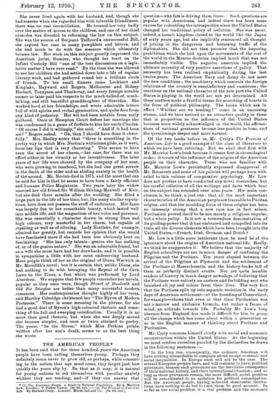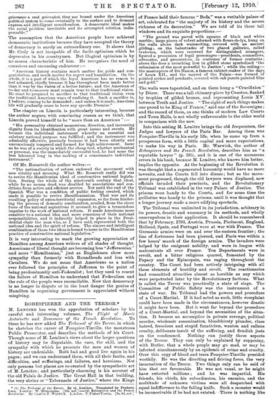THE AMERICAN PEOPLE.* IT has been said that for three
hundred years the American people have been calling themselves young. Perhaps they definitely mean never to grow old, or perhaps, while consent- ing to the notion that age must come, they forget just how quickly the years slip by. Be that as it may, it is natural for young nations to ask themselves with peculiar anxiety whither they are tending, and—if they can answer that
• (1) The American People: a Study in Rational Psychology. By A. Maurice Low. London : T. Fisher lffnwin. [8s. 6d. net.]—(2) The Promise of American Life. By Herbert Croly. London: Macmillan and Co. [85. 6d. net.]
question—why fate is driving them there. Such questions are popular with Americans, and indeed there has been some excuse for redoubling the introspection since the United States changed her traditional policy of isolation. She was never, indeed, a hermit kingdom closed to the world like the Japan.
of sixty years ago, but she implicitly renounced all thought of joining in the dangerous and harassing traffic of the diplomatists. She did not then perceive that the imposing prohibition which she laid upon the movements of the rest of the world in the Monroe doctrine implied much that was not immediately visible. The negative assertion implied the ultimate necessity of very positive assertions of policy. That necessity has been realised emphatically during the last twelve years. The American Navy and Army do not meet. the new conditions ; the machinery which controls the foreign relations of the country is unsatisfactory and cumbrous ; the reactions on the national character of the new part the United.
States is playing in the world are not yet determined. All these matters make a fruitful theme for searching of hearts in the form of political philosophy. The books which ask in effect " Whither are we tending P " come in an unceasing stream, and we have noticed as an attractive quality in them that in proportion as the influence of the United States becomes more widely acknowledged in the world, the affirma- tions of national greatness become less positive in tone, and the questionings deeper and more earnest.
Of the two books before us, Mr. Croly's The Promise of American Life is a good example of the class of literature to which we have been referring. But we shall deal first with Mr. Maurice Low's book because it comes first in chronological order; it treats of the influence of the origins of the American people on their character. Those who are familiar with Mr. Maurice Low's persistently expressed disapproval of Mr. Roosevelt and some of his policies will perhaps turn with, relief to this volume of comparative psychology. Mr. Low does not profess to have conducted any novel researches, but his careful collation of all the writings and facts which bear on the subject has extended over nine years. His main con- clusion is, we think, a just one : that all the most important characteristics of the American people are traceable to Puritan origins, and that the moulding force of these origins has been so intensely strong that a new race has in fact arisen_ Puritanism proved itself to be not merely a religious impulse, but a whole polity. Is it not a tremendous demonstration of its guiding-power that it has embraced and compelled into its train all the diverse elements which have been brought into the United States,—French, Irish, German, and Dutch Mr. Low is a little more intolerant than he need be of the ignorance about the origins of American national life. Really, we think he exaggerates it. We believe that the majority of English schoolboys are not in much danger of confusing the Pilgrims and the Puritans. Ten years elapsed between the arrival of the Pilgrims at Plymouth and the settlement of the Puritans at Massachusetts, and the history-books tell of them as perfectly distinct events. Nor are quite humble readers of history in much danger nowadays of believing that the Puritans were entirely an austere and forbidding sect who' banished all joy and colour from their lives. The very fact that the Puritans split up into separate societies in the early days of American settlement—at the founding of Connecticut, for example—shows that even at that time Puritanism was not a narrow and exclusive formula, but rather a frame of mind, an attitude towards life. Probably Mr. Low's long absence from England has made it difficult for him to grasp all the change which has come about within a generation or so in the English manner of thinking about Puritans and Puritanism.
Mr. Croly concerns himself chiefly with social and economic reconstruction within the United States. At the beginning we must confess ourselves puzzled by the distinction he draws in the following sentences :—
" In the long run, consequently, the ordinary American will have nothing irremediable to complain about except economic and social inequalities. In Europe such will not be the case. The several European peoples have, and will continue to have, political grievances, because such grievances are the inevitable consequence of their national history, and their international situation ; and as long as these grievances remain, the more difficult social problem will be subordinated to an agitation for political emancipation. But the American people, having achieved democratic institu- tions, have nothing to do but to turn them to good account. In so far as the social problem is a real problem and the economic
grievance'a real grievance, they are *bound under the American political system to come eventually to the surface and to demand express and intelligent consideration. A democratic ideal makes the social problem inevitable and its attempted solution indis- pensable."
The assumption that the American people have achieved democratic institutions because they have accepted the theory of democracy is surely an extraordinary one. It shows that Mr. Croly is not incapable of the facile optimism which he deprecates in his countrymen. But illogical optimism is by no means characteristic of him. He recognises the need of conscious and unceasing endeavour:— • "American history contains much matter for, pride and con- gratulation, and much matter for regret and humiliation. On the whole, it is a past of which the loyal American has no reason to feel ashamed, chiefly because it has throughout been made better than it was by the vision of a better future; and the American of to-day and to-morrow must remain true to that traditional vision. He must be prepared to sacrifice to that traditional vision even the traditional American ways of realizing it. Such a sacrifice is, I believe, coming to be demanded ; and unless it is made, American life will gradually cease to have any specific Promise."
The chapter on Lincoln is particularly interesting, because the author argues, with convincing reason as we think, that Lincoln proved himself to be " more than an American " :— " His personality obtained momentum, direction, and increasing dignity from its identification with great issues and events. He became the individual instrument whereby an essential and salutary national purpose was fulfilled; and the instrument was admirably effective, precisely because it had been silently and unconsciously tempered and formed for high achievement. Issue as he was of a society in which the cheap tool, whether mechanical or personal, was the immediately successful tool, he had none the less laboured long in the making of a consummate individual instrument."
Of Mr. Roosevelt the author writes :— " The nationalization of reform endowed the movement with new vitality and meaning. What Mr. Roosevelt really did was to revive the Hamiltonian ideal of constructive national legisla- tion. During the whole of the nineteenth century that ideal, while by no means dead, was disabled by associations and con- ditions from active and efficient service. Not until the end of the Spanish War was a condition of public feeling created, which made it possible to revive ITamiltonianism. That war and its resulting policy of extra-territorial expansion, so far from hinder- ing the process of domestic amelioration, availed, from the sheer force of the national aspirations it aroused, to give a tremendous impulse to the work of national reform. It made Americans more sensitive to a national idea and more conscious of their national responsibilities, and it indirectly helped to place in the Presi- dential chair the man who, as I have said, represented both the national idea and the spirit of reform. The sincere and intelligent combination of those two ideas is bound to issue in the Hamiltonian practice of constructive national legislation."
It is very interesting to mark the growing appreciation of Hamilton among American writers of all shades of thought. Americans of liberal thought are becoming less "Jeffersonian " and more "Hamiltonian," just as Englishmen show more sympathy than formerly with Roundheads and less with Cavaliers. We do not mean that Americans as a nation ever followed the principles of Jefferson to the point of being predominantly anti-Federalist ; but they used to resent the failure of Hamilton to understand that Federalism and the rule of the people were reconcilable. Now that democracy is no longer in dispute or in the least danger the genius of Hamilton in organising government is appreciated without misgiving.











































 Previous page
Previous page